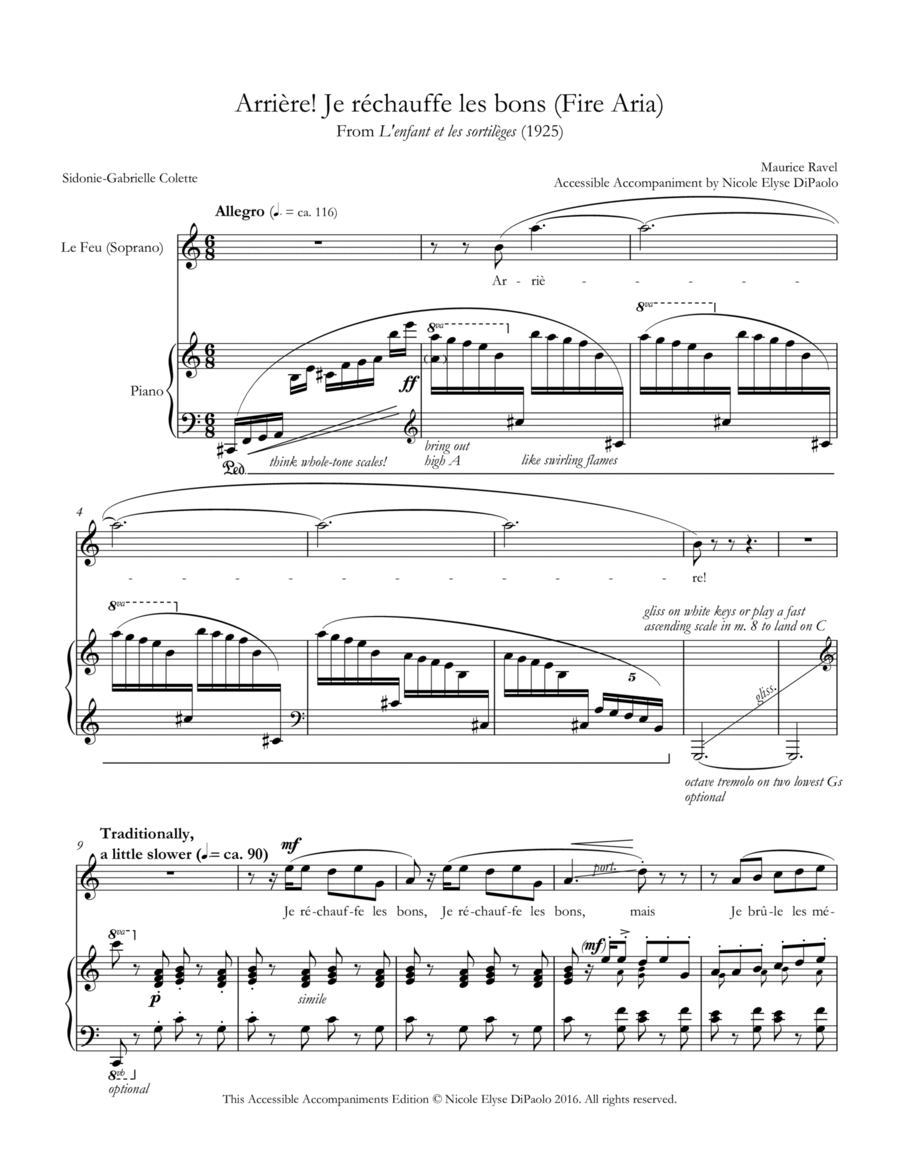Soprano voice,Vocal Solo - Level 5 - Digital Download SKU: A0.1185473 Composed by Maurice Ravel. Arranged by Nicole Elyse DiPaolo. Classical,Opera. 6 pages. Nicole Elyse DiPaolo #785149. Published by Nicole Elyse DiPaolo (A0.1185473). The first of its kind, this is a genuinely playable and slightly-to-moderately simplified piano/vocal reduction of ArriĆØre! Je rĆ©chauffe les bons, the Fire Aria from Ravel's L'enfant et les sortilĆØges (1925)ā. Sopranos who love this aria no longer need to fear bringing it in for auditions, last-minute performing engagements, or other situations in which the pianist may have to sight-read from the often chaotic vocal score, particularly if the murmuring section after the standard audition cut, which is very poorly rendered in the standard reduction, is also being included. Pianists may now enjoy playing this aria comfortably, without risking strain/injury or audition-room chaos.This Accessible Accompaniment is more generous than standard audition cuts, ending just before L'enfant re-enters with j'ai peur. It is 91 measures in total and ideal for recitals as well. All Accessible Accompaniments, including this one, boast several unique features:1. No reduction ever requires stretches of over an octave, not including bass notes meant to be held or āfudgedā with the pedal (though octaves may also contain chord tones within them). This reduces the amount of rearranging that smaller-handed pianists must already do. Obviously, further reworkings are to be expected and pianists should feel free to add to or modify what Iāve provided.2. Iāve included less essential, but potentially desirable additional voices/passages in cue-size noteheads so that pianists can easily see them, but know that they are not necessary in a āsink or swimā accompanying situation. Presenting less essential material in cue-size noteheads also reduces visual clutter on the page.Ā 3. In addition to the composerās markings, when needed, I have included hints on particular notes to bring out when the singer is likely to need them as a pitch anchor or when it is not obvious which line should be brought out within the texture.4. All page turns have been carefully selected so as to result in the least possible disruption to the pianist when possible.Ā 5. When known, Iāve noted alternate cuts that singers might like to take within certain arias.Ā 6. In some cases Iāve modernized spelling conventions for easier readability (for example, by replacing āĆā with āssā in German arias) and occasionally I've enharmonically respelled brief passages for greater clarity. Iāve also replaced some text ācresc.ā and ādim.ā markings with hairpins, which are easier to see in high-pressure sight-reading situations.About the Arranger:Praised as a sensitive pianist and outstanding accompanist who delivers powerful interpretations, Nicole Elyse DiPaolo enjoys a multifaceted career as a sought-after collaborative pianist, educational composer, arranger, coach, private teacher, and adjunct music professor. Currently based in the Cleveland area, Ms. DiPaolo has appeared as a concerto soloist with the Ambassador Chamber Players on multiple occasions and as a recitalist, collaborator, and presenter worldwide. Currently, Ms. DiPaolo is an online Adjunct Lecturer in Music at Indiana University; the Principal Theory Teacher at Liberty Park Music, an online-only video subscription-based music school; an invited blog contributor and guest instructor at Tonebase; and a sought-after online instructor of piano, music theory, and composition who includes partimento and historical improvisation in her curricula.Ā For more information, please visit http://ndipaolo.musicaneo.com .
